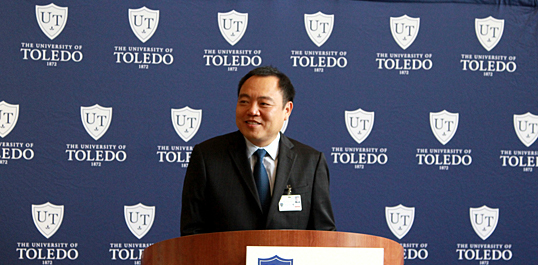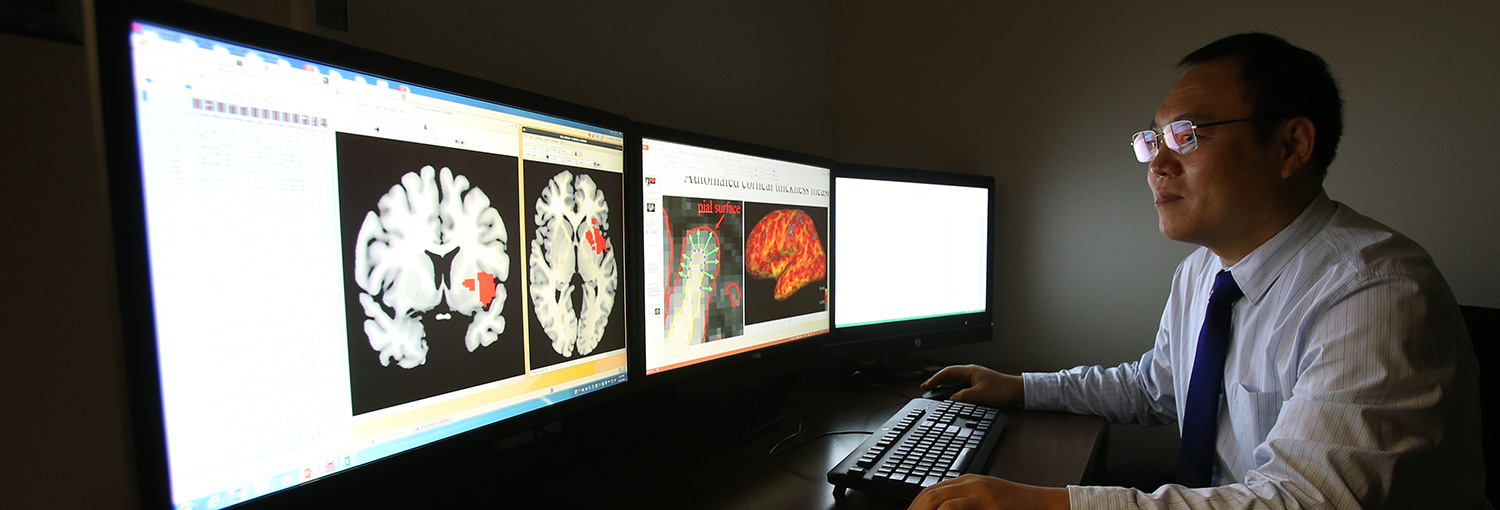Psychiatry Research
FULBRIGHT GRANT TO STUDY CHILD ABUSE PREVENTION
 About 540 children are identified as victims of abuse or neglect each year in Lucas
County.
About 540 children are identified as victims of abuse or neglect each year in Lucas
County.
“For every substantiated case of physical child abuse in the U.S., approximately 40 more exist that go undetected. It’s heartbreaking,” said Dr. Michele Knox, University of Toledo professor of psychiatry who has dedicated her life to protecting children and educating parents with alternative methods of discipline.
She recently was awarded her second Fulbright award to visit the Netherlands to find innovative and effective ways to improve child abuse prevention in the United States.
“I am honored to receive this award. It is an opportunity to bring home new ideas and approaches because the Netherlands is among the nations with the lowest rates of child maltreatment deaths,” Knox said. “I will be learning from the people there and benefiting from their expertise, knowledge and success.”
Starting in spring 2019, Knox will spend nearly three weeks at the University of Utrecht, the largest university in the Netherlands.
$3.38 million to study PTSD
 A University of Toledo researcher has received a $3.38 million award from the National
Institute of Mental Health to study the brain for early signs of post-traumatic stress
disorder (PTSD) after an injury.
A University of Toledo researcher has received a $3.38 million award from the National
Institute of Mental Health to study the brain for early signs of post-traumatic stress
disorder (PTSD) after an injury.
PTSD is increasingly recognized as a major mental health problem, with an estimated eight million adults suffering from some form of the disorder as a result of a traumatic event.
The largest grant received by the University from the National Institute of Mental Health, the competitive award was given to Dr. Xin Wang, associate professor of psychiatry in the College of Medicine and Life Sciences, to use MRI imaging to study the early development of PTSD in trauma victims.
His study titled “Study of Early Brain Alterations That Predict Development of Chronic PTSD,” will receive $755,000 in 2016, and a total of $3.38 million over a period of four and a half years, pending oversight and review of annual congressionally approved NIH funding levels. The NIH study section that peer-reviewed Wang’s proposal ranked it in the top 4th percentile for “major research” among those competing for mental health research funding.
The research project will study trauma patients who agree to be monitored for a period of a year during which time they will be evaluated using non-invasive, functional magnetic resonance imaging technology. This state-of-the-art diagnostic equipment is only available at UT Medical Center. Study participants will be recruited from the emergency department at UTMC, as well as the ProMedica and Mercy Health Systems.

Dr. Xin Wang developed a neuroimaging research program of acute trauma at University of Toledo Medical Center (UTMC) and ProMedica Health System (PHS) after joining UT in 2009. His program focuses on study of the pathophysiology of PTSD development after trauma. Ongoing projects examine contributions of pre-trauma genetics, childhood adversity, mild traumatic brain injury, and post-trauma maladaptive brain changes to PTSD. Dr. Wang is constantly improving analytical approaches to integrate multiple models of MRI images, symptoms, and genetic profiles for study of PTSD.
Dr.Wang’s research program utilizes productive collaborations with recognized scientists in related fields, and with internal UT experts in different specialties. External experts from the University of Michigan Departments of Psychiatry, Psychology, and fMRI Laboratory, Case Western Reserve University Department of Psychiatry, University of North Carolina Emergency Department, and Ohio State University Department of Physical Medicine and Rehabilitation are actively involved in Dr. Wang’s trauma research at Toledo. Dr. Wang also actively collaborates with other researchers from UT, including faculty in Psychiatry, Emergency Medicine, Psychology, Radiology, Trauma Surgery, Family Medicine, Neurosciences, and Neurosurgery, and from ProMedica Health System ED and Trauma Service.
Dr. Wang’s research program is supported by the MRI facility in the UT Department of Radiology, which provides access to the MRI scanner at reduced cost. Recent upgrades havebeen done on the 3T scanner used in the planned research. UT commitment to the PI is demonstrated by salary support, start-up funds, computers, laboratory, office space, and recent promotion from Assistant to Associate Professor rank. ProMedica Health System’s commitment to developing the PI’s trauma research program is demonstrated by use of clinical staff and a $25,000 Translational Research Stimulation Award in 2011 that supported preliminary work for this proposal. Both institutes provide research space in ED and trauma units, IT support, clerical support, and administrative support.
Elissar Andari Lab - Autism & Social Affective Neuroscience (ASAN)
 The lab is studying the neurobiological correlates of social deficits in autism spectrum
disorder and other psychiatric disorders. At ASAN, we are adopting a multimodal approach
combining behavioral neuroscience, epigenetics and neuroimaging to uncover the nature
of social deficits. We are also using machine learning approaches to determine biotypes
of autism that are biologically relevant and that can respond best to selective treatments.
Our lab focuses on using translational and clinical approaches to investigate new
potential pharmacological treatments for deficits in social cognition.
The lab is studying the neurobiological correlates of social deficits in autism spectrum
disorder and other psychiatric disorders. At ASAN, we are adopting a multimodal approach
combining behavioral neuroscience, epigenetics and neuroimaging to uncover the nature
of social deficits. We are also using machine learning approaches to determine biotypes
of autism that are biologically relevant and that can respond best to selective treatments.
Our lab focuses on using translational and clinical approaches to investigate new
potential pharmacological treatments for deficits in social cognition.
- Autism Biotyping
- Therapeutics for Autism
- Translational research
- Increase risk for psychiatric disorders: child maltreatment
Posters and Manuscripts
- Brennan J, Phelps K, McGrady A, Schultz P. Introducing lifestyle medicine into family medicine: Theory and applications. Int J Psychiatry Med. 2023 Nov 17:912174231215917. doi:10.1177/00912174231215917
- Zhu X, Kim Y, Ravid O, He X, Suarez-Jimenez B, Zilcha-Mano S, Lazarov A, Lee S, Abdallah CG, Angstadt M, Averill CL, Baird CL, Baugh LA, Blackford JU, Bomyea J, Bruce SE, Bryant RA, Cao Z, Choi K, Cisler J, Cotton AS, Daniels JK, Davenport ND, Davidson RJ, DeBellis MD, Dennis EL, Densmore M, deRoon-Cassini T, Disner SG, Hage WE, Etkin A, Fani N, Fercho KA, Fitzgerald J, Forster GL, Frijling JL, Geuze E, Gonenc A, Gordon EM, Gruber S, Grupe DW, Guenette JP, Haswell CC, Herringa RJ, Herzog J, Hofmann DB, Hosseini B, Hudson AR, Huggins AA, Ipser JC, Jahanshad N, Jia-Richards M, Jovanovic T, Kaufman ML, Kennis M, King A, Kinzel P, Koch SBJ, Koerte IK, Koopowitz SM, Korgaonkar MS, Krystal JH, Lanius R, Larson CL, Lebois LAM, Li G, Liberzon I, Lu GM, Luo Y, Magnotta VA, Manthey A, Maron-Katz A, May G, McLaughlin K, Mueller SC, Nawijn L, Nelson SM, Neufeld RWJ, Nitschke JB, O'Leary EM, Olatunji BO, Olff M, Peverill M, Phan KL, Qi R, Quidé Y, Rektor I, Ressler K, Riha P, Ross M, Rosso IM, Salminen LE, Sambrook K, Schmahl C, Shenton ME, Sheridan M, Shih C, Sicorello M, Sierk A, Simmons AN, Simons RM, Simons JS, Sponheim SR, Stein MB, Stein DJ, Stevens JS, Straube T, Sun D, Théberge J, Thompson PM, Thomopoulos SI, van der Wee NJA, van der Werff SJA, van Erp TGM, van Rooij SJH, van Zuiden M, Varkevisser T, Veltman DJ, Vermeiren RRJM, Walter H, Wang L, Wang X, Weis C, Winternitz S, Xie H, Zhu Y, Wall M, Neria Y, Morey RA. Neuroimaging-based classification of PTSD using data-driven computational approaches: A multisite big data study from the ENIGMA-PGC PTSD consortium. Neuroimage. 2023 Dec 1;283:120412. doi:10.1016/j.neuroimage.2023.120412
- Li GZ, Liu PH, Zhang AX, Andari E, Zhang KR. A resting state fMRI study of major depressive disorder with and without anxiety. Psychiatry Research. 2022;315:8. Doi:10.1016/j.psychres.2022.114697
- Dynes ME, Rasiah SS, Knox M. When Attitudes Become Obstacles: An Exploratory Study of Future Physicians' Concerns about Reporting Child Maltreatment. Children (Basel). 2023;10(6). Doi:10.3390/children10060979
- Nawras M, Beran A, Yazdi V, Hecht M, Lewis C. Phosphodiesterase inhibitor and selective serotonin reuptake inhibitor combination therapy versus monotherapy for the treatment of major depressive disorder: a systematic review and meta-analysis. International Clinical Psychopharmacology. 2023;38(4):261-268. Doi:10.1097/yic.0000000000000457
- Xie H, Shih CH, Aldoohan SD, Wall JT, Wang X. Hypothalamus volume mediates the association between adverse childhood experience and PTSD development after adulthood trauma. Transl Psychiatry. 2023;13(1):274. Doi:10.1038/s41398-023-02576-2
- Shih CH, Zhou A, Aldoohan S, Xie H, Wang X. Post-Trauma Changes in Fear Associated Learning Function During Posttraumatic Stress Disorder Development. Biological Psychiatry. 2023;93(9):S216-S216.
- Xie H, Shih CH, Aldoohan S, Wall J, Wang X. Hypothalamus Volume Mediates the Association Between Aversive Childhood Experience and PTSD Development After Adulthood Trauma. Biological Psychiatry. 2023;93(9):S321-S322.
- Sun D, Rakesh G, Haswell CC, Logue MW, Wang X, Thompson PM, Morey RA. Comparison of Methods: for Site Harmonization Using PTSD as a Test Case. Biological Psychiatry. 2023;93(9):S42-S43.
- Chidiac N, Popovich C, Grau A, Shih C, Zhou A, Wang X, Xie H. A Longitudinal Case-Control Analysis of Changes in Brain Activation of Fear Associated Learning From a Baseline Before COVID-19 Pandemic. Biological Psychiatry. 2023;93(9):S132-S132.
- Lewis, C, & Brennan, C (2023). “Clozapine & Valbenazine for Treatment of Tardive Cervical Dystonia: A Case Report”: Tardive Cervical Dystonia. Translation: The University of Toledo Journal of Medical Sciences, 11(2). https://doi.org/10.46570/utjms.vol11-2023-526
- Flux MC, Fine TH, Poplin T, Al Zoubi O, Schoenhals WA, Schettler J, Refai HH, Naegele J, Wohlrab C, Yeh H-W, Lowry CA, Levine JC, Smith R, Khalsa SS, Feinstein Exploring the acute cardiovascular effects of Floatation-REST. Frontiers in Neuroscience. 2022;16. Doi:10.3389/fnins.2022.995594
- Rooney EA, Hallauer CJ, Xie H, Shih CH, Rapport D, Elhai JD, Wang X. Longitudinal PTSD symptom trajectories: Relative contributions of state anxiety, depression, and emotion dysregulation. J Affect Disord. 2022;308:281-288. Epub ahead of print 20220419. Doi:10.1016/j.jad.2022.04.078.35452754.
- Kelly V, Hong S, McHugh M, Patel M, Jezak J, Kagy K. The woman who kept passing out. Current Psychiatry. May 2022;21(5):44-49. Doi:10.12788/cp.0243.
- Dowling J, Williams KS, Lynch D, Knox M. Factors Associated with the Writing of Opioid Prescriptions. International Journal of Mental Health and Addiction. Apr 2022:10. Doi:10.1007/s11469-022-00823-z
- Lughmani MB, Shih CH, Kaminski B, Elsamaloty H, Wang X, Xie H. Orbitofrontal Cortical Thickness is Associated With Lifetime Trauma History and PTSD and Depression Symptoms After Acute Trauma. Biological Psychiatry. 2022;91(9):S358-S358.
- Li GZ, Liu PH, Zhang AX, Andari E, Zhang KR. A resting state fMRI study of major depressive disorder with and without anxiety. Psychiatry Res. 2022;315:114697. Doi:10.1016/j.psychres.2022.114697
- Grau AS, Xie H, Redfern RE, Moussa M, Wang X, Shih CH. Effects of acute pain medications on posttraumatic stress symptoms in early aftermath of trauma. Int Clin Psychopharmacol. 2022;37(5):201-205. Doi:10.1097/yic.0000000000000413
- Todorovic K, O'Leary E, Ward KP, Devarasetty PP, Lee SJ, Knox M, Andari E. Prevalence, increase and predictors of family violence during the COVID-19 pandemic, using modern machine learning approaches. Frontiers in Psychiatry. 2022;13. Doi:10.3389/fpsyt.2022.883294
- Gibbons E, Stein C, Springer J, Roemhild E, Meadows E, Dowling J. Knowledge, Attitudes, and Beliefs of Pediatric Health Care Workers: Understanding the Response to COVID-19. Journal of Pediatric Health Care. 2022;36(4):305-309. Doi:10.1016/j.pedhc.2022.04.002
- Rilling JK, Richey L, Andari E, Hamann S. The neural correlates of paternal consoling behavior and frustration in response to infant crying. Article; Early Access. Dev Psychobiol.14. doi:10.1002/dev.22092
- Tate DF, Dennis EL, Adams JT, Adamson MM, Belanger HG, Bigler ED, Bouchard HC, Clark AL, Delano-Wood LM, Disner SG, Eapen BC, Franz CE, Geuze E, Goodrich-Hunsaker NJ, Han K, Hayes JP, Hinds SR, Hodges CB, Hovenden ES, Irimia A, Kenney K, Koerte IK, Kremen WS, Levin HS, Lindsey HM, Morey RA, Newsome MR, Ollinger J, Pugh MJ, Scheibel RS, Shenton ME, Sullivan DR, Taylor BA, Troyanskaya M, Velez C, Wade BSC, Wang X, Ware AL, Zafonte R, Thompson PM, Wilde EA. Coordinating Global Multi-Site Studies of Military-Relevant Traumatic Brain Injury: Opportunities, Challenges, and Harmonization Guidelines. Article; Early Access. Brain Imaging Behav.29. doi:10.1007/s11682-020-00423-2
- Rapport D, McGrady A, Saju L, Lynch D. A Naturalistic Study of Outcomes for Durable Remission in Patients With Bipolar Disorder. J Psychiatr Pract. Mar 5 2021;27(2):86-91. doi:10.1097/pra.0000000000000530
- Magalhaes C, Knox M. A Multi-Site Study of the ACT Raising Safe Kids Program in Portugal. J Aggress Maltreatment Trauma. Doi:10.1080/10926771.2021.1933287
- Andari E, Massa NM, Fargotstein MD, Taylor NB, Halverson DM, Owens AV, Currin DL, Bhattacharya A, Gitman D, Cuthbert BC, Young LJ, Duncan EJ. Effects of Oxytocin on Emotion Recognition in Schizophrenia A Randomized Double-Blind Pilot Study. J Clin Psychopharmacol. 2021;41(2):103-113. Doi:10.1097/jcp.0000000000001367
- Andari E. New Avenues for Serotonin and Oxytocin as a Potential Combination Drug Treatment for Neuropsychiatric Disorders. Biological Psychiatry-Cognitive Neuroscience and Neuroimaging. 2021;6(11):1038-1039. Doi:10.1016/j.bpsc.2021.08.002
- Andari E, Kaundinya G, O'Leary E, Caceres G, Rilling J, Cubells J, Young L. Oxytocin Normalizes Functional Connectivity Between Salience and Visual Networks in Autism Spectrum Disorder. Neuropsychopharmacology. 2021;46(SUPPL 1):128-128.
- Xie H, Huffman N, Shih CH, Cotton AS, Buehler M, Brickman KR, Wall JT, Wang X. Adverse childhood experiences associate with early post-trauma thalamus and thalamic nuclei volumes and PTSD development in adulthood. Psychiatry Res Neuroimaging. 2022;319:111421. Doi:10.1016/j.pscychresns.2021.111421
- Teaching Lifestyle Medicine to Medical Students by Increasing Self Awareness. Angele McGrady, Julie Brennan, Amy Riese, Jamie Dowling. Frontiers in Medicine and Research, November 2021
- Single, Fixed-Dose Intranasal Ketamine for Alleviation of Acute Suicidal Ideation. An Emergency Department, Trans-Diagnostic Approach: A Randomized, Double-Blind, Placebo- Controlled, Proof-of-Concept Trial. Cheryl McCullumsmith. Archives of Suicide Research, February 2021
- Writing letters for transgender patients undergoing medical transition. Amy Riese, Current Psychiatry, Aug 2021
- SSRIs: Applications in inflammatory lung disease and implications for COVID-19. Claire Kyung Sun Meikle, Justin Fortune Creeden, Cheryl McCullumsmith, Randall G. Worth, Neuropsychopharmacology Reports, July 2021
- Fluoxetine as an anti-inflammatory therapy in SARS-CoV-2 infection. Justin Fortune Creeden, Ali Sajid Imami, Hunter M. Eby, Cassidy Gillman, Kathryn N. Becker, Jim Reigle, Elissar Andari, Zhixing K. Pan, Sinead M. O’Donovan, Robert E. McCullumsmith, Cheryl B. McCullumsmith, Biomedicine & Pharmacotherapy, June 2021
- Dispositional optimism mediates relations between childhood maltreatment and PTSD symptom severity among trauma-exposed adults. Jenny Chena, Nicole M. Christ, Chia-Hao Shih, Hong Xie, Stephen R. Grider, Chandani Lewis, Jon D. Elhai, Xin Wang, Child Abuse & Neglect, May 2021
- Considerations for fair prioritization of COVID-19 vaccine and its mandate among healthcare personnel. Katarina Hughes, Vinaya Gogineni, Chandani Lewis & Abhishek Deshpande. Current Medical Research and Opinion, April 2021
- Oral Valproate Sodium as an alternative to Benzodiazepine in the treatment of Catatonia – A Case report. Jacob C. Maier Daniel Rapport Alex McCormick and Chandani Lewis Translation UT Journal of Medical Sciences, Feb 2021
- Oxytocin's anti-inflammatory and proimmune functions in COVID-19: a transcriptomic signature-based approach. Ali S Imami, Sinead M O'Donovan, Justin F Creeden, Xiaojun Wu, Hunter Eby, Cheryl B McCullumsmith, Kerstin Uvnäs-Moberg, Robert E McCullumsmith, Elissar Andari, Physiology Genomics , Aug 2020
- Kidney transplant recipient conversation disorder treated with ECT. Rachel Beeson , Stavros Stefanopoulos, Daniel Rapport, Jorge Ortiz, Translation UT Journal of Medical Sciences, 2020 May
- Ketamine for acute suicidal ideation. An emergency department intervention: A randomized, double‐blind, placebo‐controlled, proof‐of‐concept trial. Yoav Domany, Richard C. Shelton, Cheryl B. McCullumsmith. Depression and Anxiety, Oct 2019
- Oxytocin Dose-Dependent Effects on Brain Function During a Socially Dynamic Game in Autism Spectrum Disorders (PDF, June 2021)
- Skin picking behavior in a patient with schizoaffective disorder John Edminister, Chandani Lewis, Poster presented at 26th Annual Symposium on Research in Psychiatry, Psychology, and Behavioral Sciences, April 2019 (PDF)
- Implementation of Child Advocacy Studies Training (CAST) in Medical EducationMichele Knox, Melissa Stephens. Poster presented at the American Medical Association Change MedEd Convention, Chicago, IL, 2019 (PDF)
- Myasthenia Gravis with Schizophrenia: A Rare Combination with Long- Term Treatment Challenges Meghana Medavaram, Barbara Funke, Chandani Lewis. Poster presented at the American Psychiatric Association, June 2019 (PDF)
- Effects of Resiliency Program on burnout and resiliency in FM residents Julie Brennan , Angele McGrady , Jennifer Tripi, Archit Sahai, Megan Frame, Alyse Stolting, and Amy RieseThe International Journal of Psychiatry in Medicine, July 2019 (PDF, July 2019)
- Preliminary study examining the effect of mTBI on PTSD symptoms following acute trauma Palguna R. Thalla, Chia-Hao Shih, David C. Miller, Jeremy J. Mathews, Aaron S. Grau, Andrew S. Cotton, Nicole M. Christ, Jyothika S. Yermal, Kristopher Brickman, Hong Xie, Xin Wang , Poster presented, July 2019 (PDF)
- Characteristics Associated with Depression and Suicide Residents Alan Levy, Ramzi Nahhas, Suzanne Sampang, Karen Jacobs, Christina Weston, Cathleen Cerny-Suelzer, Amy Riese, Mark Munetz, Janet Shaw, Academic Psychiatry, June 2019 (PDF)
- Letter to the Editor in Toledo Blade: Focus on Doctors Resiliency Angele McGrady, June 2019 (PDF)
- Perceptions of Residents and their Training Directors Wellness Education Alan Levy, Ramzi Nahhas, Suzanne Sampang, Karen Jacobs, Christina Weston, Cathleen Cerny-Suelzer, Amy Riese, Julie Niedermier, Mark Munetz, Janet Shaw, Ryan Mast, Academic Psychiatry, April 2019 (PDF)
- Effects of a Lifestyle Medicine Elective on Self Care Behaviors in Preclinical Medical Students, Angele McGrady, Dalynn Badenhop, Denis Lynch, Applied Psychophysiology and Biofeedback, March 2019 (PDF)
- AADPRT Poster: Comparison of Burnout and Resiliency in Psychiatry Residents Compared to Other SpecialtiesAmy Riese, Bushra Rizwan, Julie Brennan, Angele McGrady, Poster presented at American Association of Directors of Psychiatric Residency Training, Feb 2019 (PDF)
Current Research Projects
| Faculty Member | Sponsor | Grant Title and Description |
|
PI: Xin Wang, MD, PhD |
U.S. Department of Health and Human Services
|
Community Project Funding/Congressionally Directed Spending (CPF/CDS)Description: This grant provides sophisticated magnetic resonance imaging (MRI) equipment such as, MRI compatible electroencephalography (EEG) and transcranial magnetic stimulation (TMS). These equipment will become the core of the new MRI research center for social determinants of health at UToledo. |
|
PI: Xin Wang, MD, PhD Co-I’s: Tian Chen, Chia Hao Shih, PhD, Hong Xie, PhD, Kevin Shuai Xu |
National Institute of Mental Health |
A large sample machine learning network analysis of vertex cortical thickness measures for high resolution definition of PTSD related cortical structure abnormalitiesDescription: This study is to develop a novel integrated analysis to identify regional and global abnormalities of brain cortical thickness in PTSD patients using a large dataset of more than ten thousand subjects in a global consortium. |
|
PI: Michele Knox, PhD |
|
Engaging Fathers in Cross-Cutting Violence Prevention: A Dual Generation Evaluation of the ACT Raising Safe Kids Program to Prevent Multiple Forms of ViolenceDescription: The ACT Raising Safe Kids (ACT) program was developed by the American Psychological Association and identified in the Centers for Disease Control & Prevention’s technical package (“Preventing Child Abuse & Neglect”) as a promising strategy to prevent child maltreatment. Evidence suggests the ACT program reduces coercive, harsh, and physically aggressive parenting practices; increases positive, nurturing parenting practices; and reduces children’s externalizing, aggressive, bullying behavior. The overall goal of the proposed project is to determine the efficacy of the ACT program to prevent multiple forms of violence by male caregivers and their children over time. |
|
PI: Hong Xie, PhD Co-I’s: Xin Wang, MD, PhD, Jon Elhai, PhD, Chia Hao Shih, PhD |
National Institute of Mental Health |
Using pre-pandemic baseline data in people with and without PTSD to study effects of the COVID-19 pandemic on mental health and brain emotion circuitsDescription: This study examines the COVID-19 pandemic effects on the research participants of pre-pandemic studies by comparing the data collection before and during the pandemic. |
|
PI: Scott Pappada Co-I’s: Cheryl McCullumsmith, MD, PhD Tanvir Singh, MD Brent Cameron, MD, Joan Duggan, MD |
Ohio Department of Higher Education |
Prediction of Relapse in Opioid Addiction via a Novel Wearable Technology (PreLapse) |
|
PI: Michele Knox, Ph.D. |
Multiple Sponsors |
ACT Program EvaluationDescription: This study examines the effectiveness of the ACT Raising Safe Kids program at various sites in and outside the U.S. |
|
PI: Michele Knox, Ph.D.
|
|
Effectiveness of Medical Student Training in Child AdvocacyDescription: This study examines the effectiveness of educational interventions in preparing future physicians (medical students and residents) to address physical punishment of children and child maltreatment |
|
PI: Elissar Andari, Ph.D. |
ProMedica Health System |
Autism and Social NeuroscienceDescription: The goal is to develop an autism program in Toledo area to investigate the nature of behavioral and brain dysfunctions in autism and to target new treatments within a precision medicine approach. We are using new behavioral and brain function technology to unravel different biotypes within Autism Spectrum Disorders. By using a multimodal approach (behavioral, neuroimaging, genetics and machine learning, transdiagnostics and multigenerational work), we can move the autism field forward and find optimal future treatments. |
|
PI: Elissar Andari, Ph.D. |
University of Toledo Foundation |
Adjunctive Therapeutic Potential of Oxytocin for COVID-19 (OxyCovid project)Description: The goal of this project is study the role of oxytocin, a neuropeptide known for its role in social attachment, in a coronavirus infectious disease. We are currently conducting a translational study in collaboration with the Neurosciences and Immunology Departments to examine the safety and potential efficacy of this treatment. Also, thanks to this grant, we are also investigating the mechanisms of action of oxytocin in infectious disease, a new field of investigation |
Past Research Projects
| Faculty Member | Sponsor | Grant Title and Description |
|
PI: Xin Wang, M.D., Ph.D. Co-I’s: Kristopher Brickman, M.D., Mark Buehler, Jon Elhai, Ph.D., Xie Hong, Ph.D., Kevin Shuai |
Primary Sponsor: National Institutes of Health Secondary Sponsor: National Institute of Mental Health |
Study of early brain alterations that predict development of chronic PTSDDescription: This study explores the risk factors for PTSD development in the early post traumatic period in order to design effective approaches to prevent PTSD. The trauma (e.g., motor vehicle accident) survivors are examined using psychological questionnaires and MRI techniques. Patient’s psychological conditions, as well as brain functions and structures, in the days to weeks after trauma are used to predict the PTSD symptoms in the long-term.
|
|
PI: Jianyang Du, Ph.D. U of Tennessee Co-I and Univ of Toledo Site PI: Xin Wang, M.D., Ph.D. |
National Institutes of Health |
CO2 Inhalation enhances the lability of fear memoryDescription: Elucidate how protons, functioning as neurotransmitters, regulate fear circuits. The proposed work will determine how protons and ASICs regulate the lability of fear memories to yield memory modification. |


